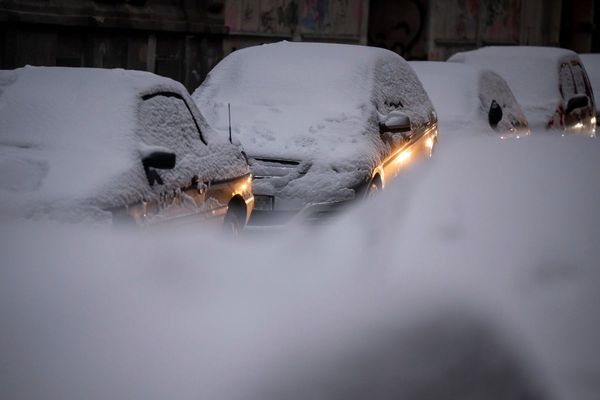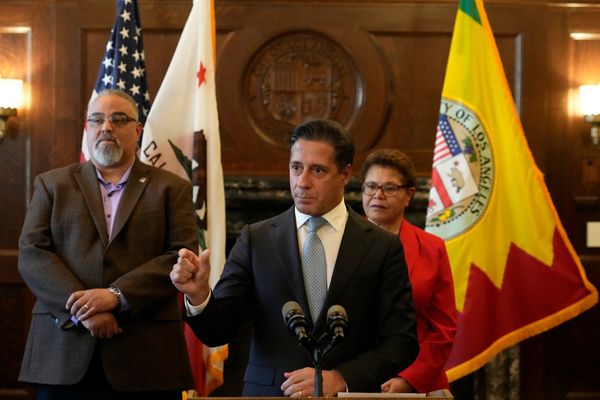SAN DIEGO — After winning reelection to his swing district in coastal San Diego and Orange counties, Rep. Mike Levin is now preparing to confront environmental problems and veterans’ affairs in a divided Congress.
“It’s a great honor to keep representing the community,” Levin, D-Calif., said in an interview. “I think very seriously every day about what I can do to move forward, whether it be dealing with the environment, nuclear waste, the rail corridor or veterans issues.”
The closely-watched 49th Congressional District race was decided this week after months of fierce campaigning over issues including the economy and abortion rights.
As of Friday, the Democratic incumbent led by 5.2 percentage points over his Republican opponent Brian Maryott. Maryott conceded the race earlier in the week.
The contest — one of a handful of battleground races seen as pivotal in deciding which party would control Congress — had drawn $20 million in campaign spending, along with a visit from President Joe Biden the week before Election Day.
Although Republicans won the 218 seats they needed to take back the U.S. House of Representatives, losses in such districts ensured a narrow GOP majority that could limit the party’s options in the closely divided House.
Thad Kousser, chair of political science at the University of California, San Diego, said Levin’s record on local issues also made him a difficult target for his challenger.
“This is the sort of seat and sort of incumbent that it would take a red wave to dislodge,” Kousser said. “Mike Levin didn’t open himself up to a lot of attacks. He didn’t have any scandals. There were no unforced errors that benefited the opposite party.”
Although both candidates took swipes at each others’ positions and records, they appeared to take a cue from voters’ weariness with partisan polemics and mostly refrained from personal attacks.
They heeded voters’ call for politicians to work across the aisle: Levin promised bipartisan legislation on local concerns, and Maryott noted in a statement that while his campaign slogan, “people before politics,” was arguably “a little dull,” it should be the goal of elected officials.
Maryott did not respond to a request for comment, but this week, his concession message continuing in that spirit won praise from readers. In a tweet, Maryott said he had congratulated Levin on his re-election, calling his opponent “very gracious in victory” and adding, “I also want to extend my best wishes to Mike’s family, staff, and volunteers.”
“Genuine class,” one Twitter user responded. “Work with him and bridge the partisanship,” wrote another.
Despite pending changes to House leadership, Levin said he expects to make progress on plans to secure long-term storage for spent nuclear fuel at San Onofre Nuclear Generating Station and to reopen the coastal rail line connecting Orange and San Diego counties, which closed recently due to unstable bluff conditions.
“Both of those remain top priorities for me, and neither are partisan at all,” said Levin, a former environmental attorney. “We all want to see the rail corridor fixed long-term. We’re going to continue to work across the aisle to get the nuclear waste off our coast.”
Levin also plans to continue efforts on veterans’ issues, including housing, homelessness and the career transition to civilian life.
Levin and Maryott have competed twice before, in the 2018 primary election and in the 2020 general election, when Levin held his seat by a margin of six percentage points.
This year, however, the race was friendlier to Republicans, after redistricting cut the district‘s Democratic advantage from 6 to 3 points. With the district more conservative and inflation pervasive, public and internal campaign polls predicted a tight race. And over the course of the year, the nonpartisan Cook Report reassigned the contest from “likely Democratic” to “lean Democratic” and ultimately to “tossup” weeks before the election.
In response, both candidates made themselves omnipresent in the district, canvassing neighborhoods, hosting campaign events and greeting voters on the street.
Maryott campaigned on corners near schools and shopping centers in North County in what his campaign called “drive-thru events.” Levin staffers and volunteers swept neighborhoods and scrolled through phone banks of likely voters.
Amid dissatisfaction with the economy and low approval ratings for President Joe Biden, Republicans had predicted a “red wave” that would allow them to flip the Senate and make double-digit gains in the House.
That failed to materialize, however, as the Supreme Court’s decision to reverse federal abortion protections galvanized Democrats and independent voters, and as former President Donald Trump teased a third run for the White House, following a 2020 loss that culminated in the Jan. 6, 2021, attack on the Capitol.
Although Trump did not campaign for Maryott, the shadow the former president cast over the midterms may have swayed some close races, said Gary Jacobson, a retired UCSD professor of political science and an expert on congressional elections.
“This overall election was unusual, and we’ll be sifting the reasons for that — pointing to Roe v. Wade, pointing to the intervention of Trump into the campaign,” he said. “Trump is always a great mobilizer of both sides. Democrats felt it was important to vote in a way to repudiate the big lie that Trump has been propagating about a stolen election, and punish Republicans for not repudiating that.”
This year, Jacobson added, voters hewed to their partisan preferences from the last presidential election — a departure from longtime trends.
His research, he said, has found that the share of midterm voters who stick with the same political party whose candidate they backed for president has risen over the last decade. This year, he said, more than 95 percent of them stuck with their party of choice from 2020.
The two counties’ registrars of voters will continue to release final unofficial results in coming days, and the election will be certified by Jan. 8.







